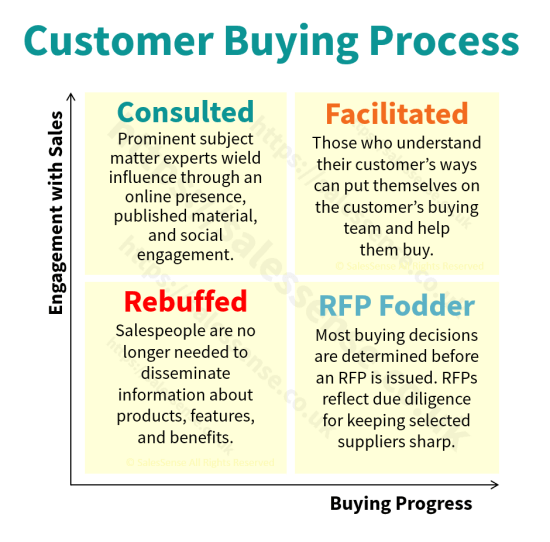Teach yourself about the customer buying process.

On Wednesday, April 1st, 2020, we began delivering a free B2B sales training course via bite-sized posts on the SalesSense LinkedIn company page. This page presents the posts in part one - Mapping a Typical Customer Buying Process.
Follow the links below to study the course.
Return to the course contents page.
In Person Couse Delivery
Have the course content delivered in part or in full, for individuals or groups in sessions led by the course author.
Online Group Training Session - £250 plus VAT. Learn more.
One-to-One Coaching Session - £150 plus VAT. Learn more.
Part One - Mapping a Typical Customer Buying Process
Should you know how your customers buy? 1.0
The steps in an unplanned process. 1.1
The steps in a planned or repeated process. 1.2
The shape of government-regulated buying procedures. 1.3
What can you do to help customers find the money? 1.4
Finding the money - some answers 1.5
Capital expenditure v operating expenditure 1.6
Understanding the customer's process - summary 1.7
Tips for Self-Led Learning
Define Your Objectives: Establish specific, attainable objectives for what you aim to learn or achieve through self-education. This step ensures clarity, focus, and motivation as you progress.
Develop a Structured Approach: Formulate a detailed learning strategy that outlines the necessary knowledge and skills. Divide the content into smaller segments, set deadlines, and mark milestones to monitor your advancement.
Compile Educational Materials: Select and collect top-quality educational tools that match your learning targets. These could include books, online courses, tutorials, videos, podcasts, or credible websites. Combining various types of resources provides diverse viewpoints and methodologies.
Create a Consistent Learning Schedule: Maintaining regularity is crucial for self-education. Allocate specific times for study in your daily or weekly schedule, ensuring you adhere to this routine.
Implement Active Learning Methods: Use active learning strategies to improve understanding and memory retention. This includes taking notes, paraphrasing key points, and using aids like flashcards or mind maps. Practice applying what you learn in practical tasks or real-world situations.
Seek Constructive Feedback: Pursue opportunities to obtain critiques on your progress from peers, mentors, or online forums in your field. Feedback is vital for identifying improvement areas and enhancing your knowledge.
Maintain Motivation and Discipline: Self-education demands discipline and sustained motivation. Engage with like-minded individuals, participate in online discussions, or visually track your progress to stay motivated. Celebrate your successes to keep your enthusiasm high.
Adopt a Growth Mindset: Embrace a growth mindset that views challenges, setbacks, and errors as opportunities for learning and development. Treat self-education as an ongoing process of enhancement.
Evaluate and Adjust: Periodically reflect on your learning journey. Evaluate which methods or resources are most beneficial and make adjustments as necessary. Remain flexible to new techniques or additional resources to overcome challenges.
Foster Lifelong Learning: Develop an enduring passion for learning. Always be curious and eager to discover new subjects or skills. This approach can transform self-education from a finite goal to a continuous personal and professional growth journey.
Have us help you achieve learning momentum. Join our scheduled one-hour-a-week professional sales career training course.
If you need a better understanding of your typical customer buying process, get in touch. Have any element of our sales training content delivered for groups or individuals through virtual classroom sessions or one-to-one coaching. Call +44 (0)1392 851500 or email jimm@salessense.co.uk for details or use the contact form here.












